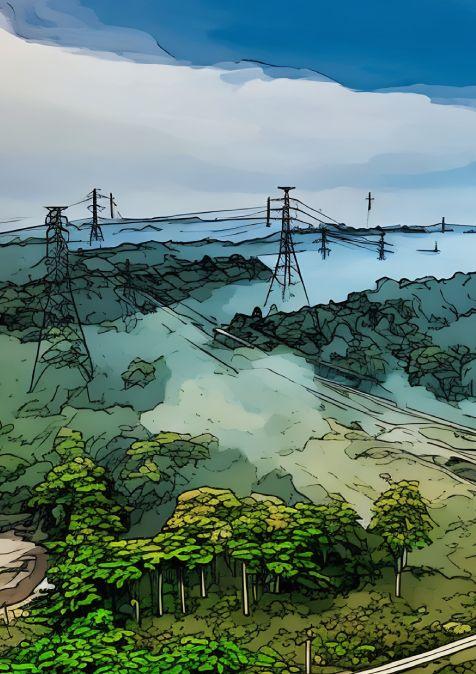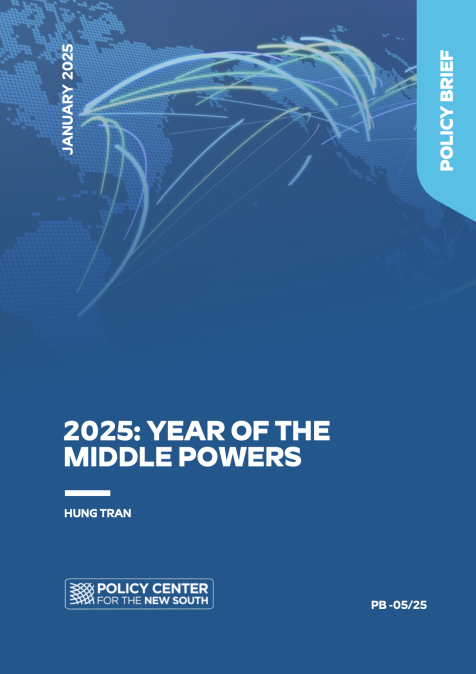Publications /
Book / Report
The Africa Economic Symposium (AES) is the Policy Center for the New South’s new major conference, alongside the renowned Atlantic Dialogues and the African Peace and Security Annual Conference (APSACO). AES aspires to be a continent-wide annual gathering of prominent economists, policymakers, and academics, which will bring together global and continental perspectives on the issues shaping the future of Africa’s economic development.
The global economy is going through a period of exceptional uncertainty that combines the aftermath of the health crisis, the consequences of the Russia- Ukraine war, and the increasing impacts of climate change. Fragmentation of the world economy is linked to the effects of the war, the potential decoupling between the economies of the major powers (United States-European Union- China-Russia), which would be associated with technological competition at the origin of more aggressive and protectionist industrial policies, and a redefinition of macroeconomic policies in Western countries.
The worsening of these risks is weakening African economies, hampering growth, fueling inflation, disrupting supply chains, increasing energy and food insecurity, reviving the specter of external debt, and raising concerns about the stability of Africa’s public finances. The interrelationships between these multiple risks make them more complex to manage. At the heart of the AES is the drive to understand the economic repercussions of these uncertainties, the risks they pose to the evolution of African economies, and the structural transformations that the continent needs to accelerate.
For African economies, the challenges are immense. The extent of the economic repercussions of the crisis depends on their structural characteristics. Against a backdrop of growing social needs and growing macroeconomic imbalances, space for economic policies is shrinking. The pressures on external balances generated or accentuated by the crisis must be examined in the light of the exposure and vulnerability of African economies to such shocks, i.e. in terms of their capacity to absorb them.
In this context, public policies and the decisions that reflect them should seek and strike a delicate balance between the requirements of economic and social recovery in the short term, and structural transformation in the medium and long terms. In the face of an uncertain outlook, African economies should reduce their vulnerabilities to current or future shocks as much as possible. As a first step, this may require rebuilding capacities to safeguard countries’ economies against greater risks. In addition, countries can become more resilient by strengthening their public policy frameworks. This context of uncertainty, conducive to large- scale risks, requires public authorities to exercise strict vigilance to preserve this resilience.
In the medium term, deepening structural reforms to generate high-quality and transformative growth is of great importance. Strong growth is perhaps the most essential remedy for eliminating macroeconomic imbalances, since a growing
economy allows for more policy space. Many African economies face the twin imperatives of reinvigorating underlying trend growth and improving its quality. The dissipation of shocks offers a chance to shift the focus back to these major long-term challenges, and thus lay the foundations for stronger, more inclusive, and more sustainable growth.
Furthermore, technology is emerging as the game changer in global economic competition. Technology is a lever of influence and positioning in the dual geoeconomic and geopolitical battle. In the twenty-first century, the battlefield on which the great powers clash is digital. New technologies (3D, biotechnology, nanotechnology, etc.) greatly stimulate the economic development of countries and consequently their positions in the global economy. Artificial intelligence in particular can enable civilian and military uses that could change the balance of power in the world by giving new actors crucial capabilities. Effective policies need to be defined to strengthen Africa’s engagement in the geopolitics of technology. African countries, which are still unaware of the role that technology plays in global competition, must change their mindsets and recognize that ignoring the geopolitical power issues linked to new technologies is not a winning strategy.
African countries are at different stages of technological transformation. A few indicators are often put forward to show that Africa has already propelled itself into the digital revolution. This is the case for some emblematic indicators of the rapidly increasing number of African start-ups specializing in technology, e-learning platforms, innovation hubs and incubators active throughout the continent, and the improvement of the quality of communication infrastructure networks. In fact, the development of the digital economy in Africa, its adoption, and its affordability vary enormously according to professional situation, location, and level of education. Research and development spending in African countries remains well below the world average. In addition to higher cognitive skills, various behavioural, interpersonal and socio-emotional skills (creativity, risk-taking, decision-making, persuasion and negotiation skills, networking and teamwork, etc.) are not widely disseminated.
The main digital sectors, despite their growth trajectories, will not be enough to offer job prospects to the millions of young graduates who enter the labour market every year. Concerns about the impact of advanced technologies on employment have fueled a growing debate on the need to adapt the social contract to the new context of rapid technological change, as well as key parameters of the social, cultural, and political environments. New technologies also offer an opportunity for African countries to keep up to date in terms of technology, and thus to reduce the gaps between them and other countries. Innovation in these areas could help diversify economies, create better-paying jobs, and catalyze economic growth and structural transformation, while addressing the existential threat of climate change.
Thus, African countries need to harness the power of science, technology, and innovation to boost economic growth and escape the middle-income trap. This will require revamping the nexus between educational policies, R&D, innovation, and economic policies, and defining modern industrial policies that will serve development through clear roadmaps and transparent objectives. In addition,
as Africa remains the continent most threatened by climate change and chronic food insecurity, science and technological innovation have the potential to smooth the energy transition and increase food production, making it a vital area of focus for promoting sustainable economic growth.
The great challenge for African economies is to acquire the capacity to implement the major innovations that will shape the future of the world economy system. Capacity is essential for countries to be able to exploit the opportunities offered by new and emerging technologies—and there is a significant gap between developed and developing countries. If Africa wants to be more than a consumer of technology and aims to be less dependent on the great powers, it must make its way and be itself an actor in technological competition. Otherwise, it risks becoming a playground for technological competition between great powers. Technological battles are being waged in a growing number of areas in which Africa is called upon to define strategies and policies that will enable it to achieve strategic autonomy. The challenge for Africa is to work with partners and multilateral organizations—such as the Organization for Economic Co-operation and Development, the World Intellectual Property Organization and others—to develop effective, open, and value-based technological standards. Through multilateral institutions, including the World Bank and the International Monetary Fund, the World Trade Organization and the G20, Africa should contribute to the establishment of an international data protection regime.
Similarly, regional groups such as Mercosur, the African Union, and ASEAN should establish a framework for their member states to cooperate closely on technological issues. These groupings would be strengthened by establishing rules and regulations, such as those on artificial intelligence. They can use the allure of access to their digital marketplaces to strengthen their alliances. The financial institutions of these regional groups should encourage companies to invest in the adoption of critical technologies, while seeking to reduce their technological dependencies.
Over two days, experts, scholars, and policymakers participated in thematic discussions revolving around these issues, setting out their views on how Africa could be positioned as the new engine of global growth. The AES centered on the theme ‘The Role of Science, Technology, and Innovation in Driving Africa’s Economic Growth’, and featured five panels and a discussion on the Annual Economic Report on Africa.
- Panel 1: Challenges of Monetary Policy: Navigating Inflation Dynamics in the Face of Supply Shocks.
- Panel 2: Challenges of Fiscal Policy: Managing Debt Sustainability
- Panel 3: Promoting Innovation-led Growth in Africa
- Panel 4: Industrial Policy for Innovation and Technology Upgrading in Africa
- Panel 5: The Power of Innovation for Sustainable Development: Meeting the Challenges of Climate Change, Energy Transition, and Food Security in Africa
- Report Presentation: Annual Report on the African Economy









